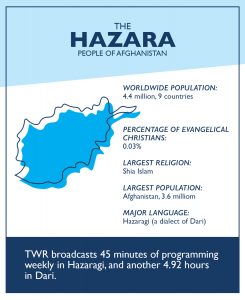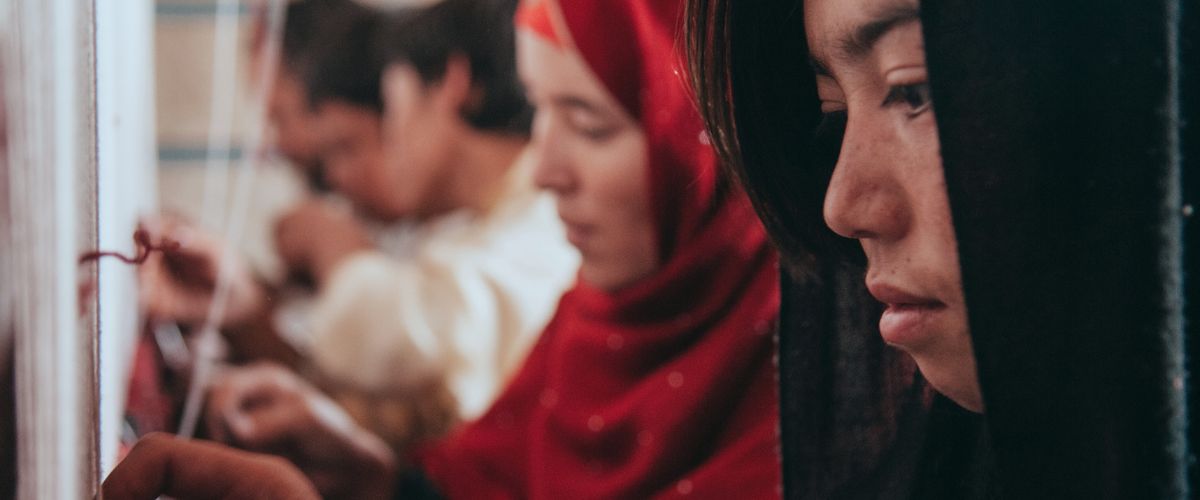Members of a Hazara family weave carpets at their home in Afghanistan. [Image by IMB]
Joel’s* life was everything you could ever dream of — in a nightmare.
Weeks after the Taliban regained control of Afghanistan in August 2021, he was arrested and jailed for his Christian faith and ministry endeavours. For nine months, he endured torture, harassment and humiliation on levels so intense and unimaginable to the average person.
“I’m still feeling the repercussions of those beatings today,” he revealed. “Particularly in my knees and my back.” And just when it seemed like things could not get any worse, they did.
On his last day behind bars, Joel faced a difficult decision.

“I know you’re a good person,” an officer told him. “I want to give you a chance to live. You have two options — renounce your faith or die.”
“I’m sorry, I don’t know how to do that,” Joel replied.
“I’ll give you another chance. Renounce your faith or I shall banish you from the face of this earth. Do you understand?” The officer brandished his gun, aiming it at Joel’s forehead.
“Please just kill me.”
“Oh, you’ve lost your mind,” the officer scoffed. “You really have lost your mind, haven’t you? You can’t tell what’s good or bad. Are you not going to do as I say?”
“No.”
The officer lowered his gun, and then proceeded to draft a medical report, declaring Joel mentally unfit to remain in lockup. Later that evening, Joel became a free man.
Not all Christians, however, are as fortunate. Though official numbers are unknown, countless Afghans have lost their lives in the pursuit of Christ. Many who get arrested never see the light of day again.
Dangerous devotion
Open Doors consistently ranks Afghanistan on its World Watch List of countries where it’s most difficult to follow Jesus. According to the CIA World Factbook, 99.7% of Afghans are Muslims, with a majority adhering to the Sunni tenet.
Various political and social factors contribute to the nation’s hostility toward Christianity. The small percentage of believers living within its borders must hide their faith, often even from family, as discovery could lead to grave consequences including death.
Members of the underground church gather discreetly and frequently change their meeting locations and times to minimize risk. Some would go as far as to download an electronic Bible on their phones right before each meeting, only to delete it once it’s over.

The Hazaras: A persecuted people
Joel knew persecution long before he knew Christ.
He is a member of the ethnic Hazara minority in Afghanistan, an overwhelmingly Shia Muslim community disfavored by the nation’s Sunni Muslim majority population. Most Hazaras live in Hazarajat, a mountainous area in central Afghanistan.
For decades, they have experienced systemic oppression and discrimination for their ethnicity and religion.
“They would call you names,” explained Hussain Andaryas, a Hazara Afghan now based in the U.S. “At school, even though I was one of the best students, I was still called names and mocked upon.”
Since the most recent government changeover, atrocities committed against the Hazara people have intensified. Examples include a bus explosion, a suicide bombing attack at an education centre and forced eviction.
The Hazaras are also an unreached people group, meaning there are not enough Hazara believers to grow the church without external support. Only 0.03% of its worldwide population are evangelical believers.
Outside Afghanistan, the Hazara diaspora — numbering over 800,000 — spans eight countries, according to Joshua Project. Many have found opportunities abroad and are thriving in their chosen vocations. Among them is Hussain Andaryas, a televangelist who has been sharing the good news with Afghans for over 30 years.
Transformative media
Raised in Afghanistan, Andaryas lived in several other countries before settling in the United States.
Though he was physically far from home, his heart ached for the lost sheep among his people. Eager to reach them for Christ, Andaryas began seeking out opportunities within media ministry.
“I wanted to preach to my people who are in Afghanistan,” he recalled. “I couldn’t go to Afghanistan, but at least I could preach to them through the radio.”
Today, Andaryas leads a satellite television and internet ministry in six languages and dialects including Hazaragi, the native tongue of the Hazara people. Every day, he receives calls and messages from people who reach out after watching a programme.
Over the years, God has used his media ministry to bring many to Christ, including Andaryas’ very own father, who for 23 years had rejected his son for following Jesus.
“Interestingly, he saw portions of my programme that were being played against me on another TV channel,” Andaryas shared. “He died at the age of 95 having received Christ. That was a blessing.”
TWR had the privilege of working with Andaryas to produce and broadcast 156 episodes of an evangelistic radio program geared toward a Hazara audience.
A listener of the programme shared, “My brother introduced me to your program five months ago. We thank God for your programme, as it has opened our eyes.
We cannot tell others about our faith because it’s too dangerous here, but our families gather frequently to listen to you. Can I call you sometimes if we have questions about our faith?”
Last year, in collaboration with Wycliffe Bible Translators, Andaryas completed the translation of the full Bible into Hazaragi — a monumental task he started in 1990.
Like Andaryas, Joel is in the heavenly business of saving lost souls.
Reaching Hazara refugees and beyond
Following his release from prison, Joel became part of the estimated 600,000 Afghans who sought refuge in neighbouring Pakistan since the events of 2021.
Within just six months of settling in a new city, he started serving his local community. Joel’s ministry now extends throughout the city, where he disciples — both in person and virtually — about 20 Afghan families, most of whom are ethnic Hazaras.
He leads worship and Bible studies, prays with and for them, and addresses any questions they might have about faith and the Word.
“A question that I get asked all the time is, ‘How could Jesus be the Son of God?’” Joel said. “Sometimes I share excerpts from TWR’s programmes to help them find answers to their questions.”
Before each meeting, he diligently prepares detailed outlines and notes for the day’s lesson, which he then distributes to each participant.
Additionally, Joel translates and produces several of TWR’s programmes that are aired over medium wave (or AM). Every week, TWR broadcasts 45 minutes of Gospel-centered programming in Hazaragi and another 5 hours in Dari. It is worth noting that Hazaragi is a dialect of Dari, and the two are mutually intelligible.
TWR comes alongside Joel and other such faithful servants by providing MP3 players and SD cards preloaded with biblically sound programming, which is then played at home churches and gatherings. Many of these resources are also distributed among Afghan believers in Pakistan and Afghanistan so they remain spiritually nourished even at home.
While Joel has found relative safety in Pakistan, life is far from easy.
Peril in Pakistan
Barely a year into his newfound freedom, Joel is faced with yet another difficult decision.
In October 2023, Pakistan launched a crackdown on undocumented foreigners. About 1.7 million individuals, including Joel, received an ultimatum — leave or risk expulsion.
Since then, 49 deportation centres have been established throughout Pakistan. By January, over half a million Afghans had returned to the country they once fled. Many families have also been forcibly separated in the process.
Already, refugees lacking proper documentation grapple with unique challenges including the inability to secure legal employment. The threat of repatriation further compounds their distress.
Though it’s hard not to feel discouraged, Joel is choosing to trust in the Lord.
“If I do get deported, it will be God’s plan,” he shared. “We have no passport, no visa, unfortunately. But we submit our lives to God and keep praying … I believe God has a plan for me. I believe that one day I’ll be able to go to another country.”
In the meantime, he is staying put to continue his ministry in Pakistan.
An opportunity for you
Have you ever considered your place in God’s plan to reach the Hazaras and the broader Afghan community?
TWR is looking for a missionary to serve as an Afghan ministry representative to help advance our radio and digital ministry among Afghans. If you or someone you know might be interested, we would love to talk.

Travelling to Afghanistan may not currently be possible for pastors and missionaries, but media overcomes barriers to bring the hope of Christ to those living there.
“The more programmes are produced, the more availability they have to the Gospel,” Andaryas said. “Everyone has a phone or something they could use to download apps.”
Andaryas reminds believers that we are God’s fellow workers.
“God can do everything Himself,” he said. “But what a privilege it is to be the hands and feet of God on earth. It’s a privilege I cannot understand why He’s given me, a foolish person.”
To learn more about the role, visit twr.org/afghan-representative.
* Not his real name




